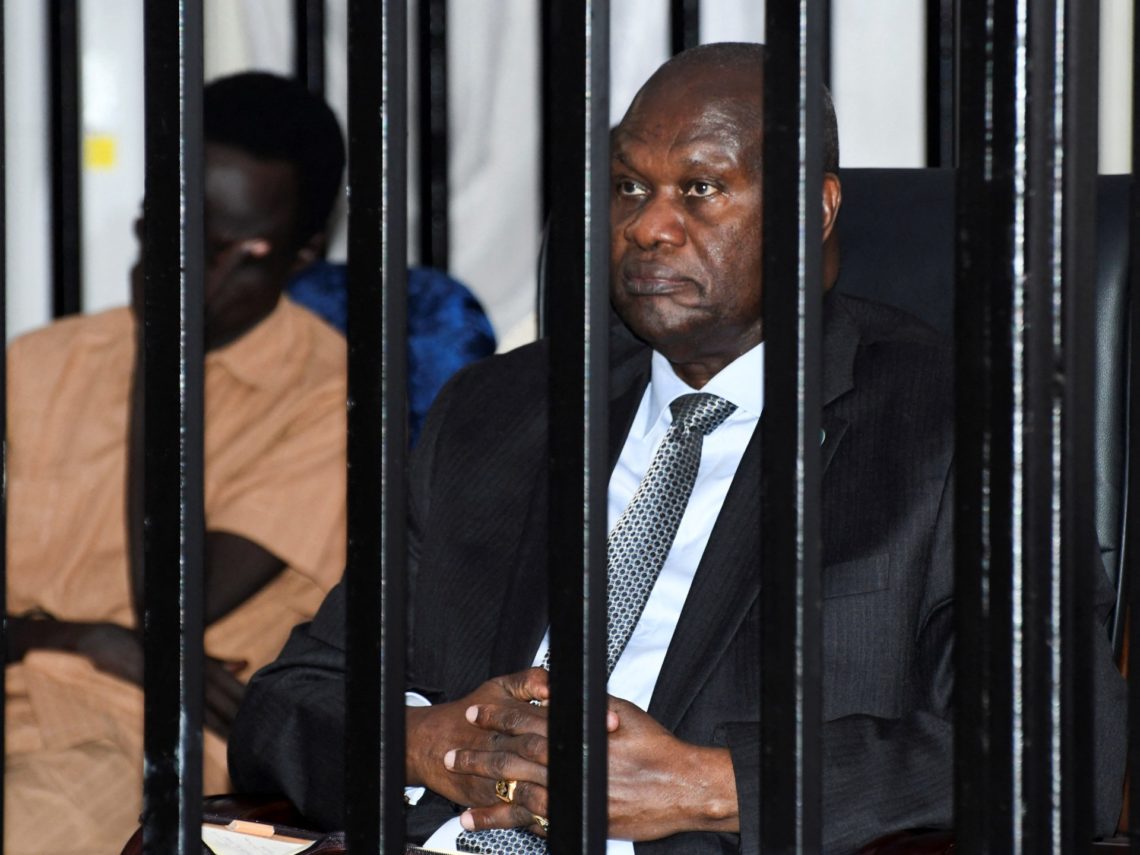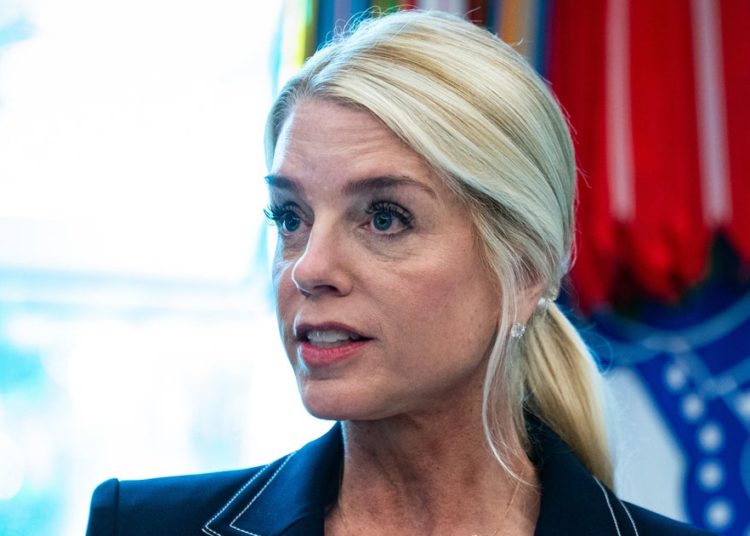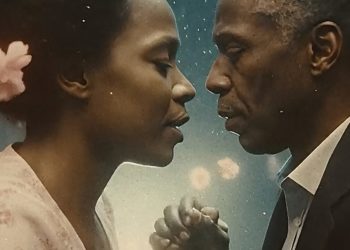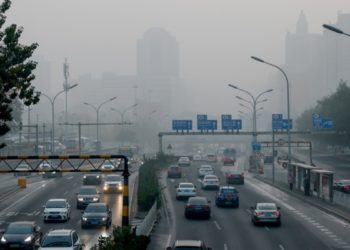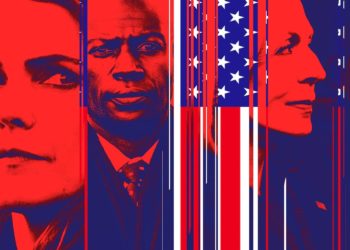Juba, South Sudan – As he was ushered into a barred holding cell inside an events hall turned courtroom on a morning in mid-October, the bright smile and relaxed demeanour of Riek Machar, South Sudan’s embattled first vice president and opposition leader, belied both the severity of the charges against him and the immense stakes for his country.
In September, Machar and 20 co-defendants from his Sudan People’s Liberation Movement/Army-in-Opposition (SPLM/A-IO) party were indicted on charges of terrorism, treason, and crimes against humanity for their alleged role in a March attack on a military garrison that the government says killed more than 250 soldiers.
Machar has denied the charges while the SPLM-IO has called the accusations “baseless” and “politically motivated”.
As more than 1,000 people streamed into the venue to watch the proceedings – which began in late September and have been open to the public – several observers told Al Jazeera they were concerned by what they saw as the government’s weaponisation of the justice system to sideline President Salva Kiir’s chief political rival. They warned that the trial was deepening resentment among communities that revere Machar, and risked intensifying violence already unfolding across rural swaths of the country.
“This is a political trial. The state is using the court against its opponents,” said Lincoln Simon, a 37-year-old nonprofit director who says he’s attended every session out of a sense of civic duty. He thinks Machar is being scapegoated to hide broader government failures, like spiralling inflation. “Our leaders have failed, and now they are looking for someone to pin the blame on.”
William Tong, 62, a retired factory worker, is a longtime supporter of Machar’s opposition party who has also been attending the proceedings. “We are watching this trial to see whether or not this is a country run by the rule of law,” he said, adding that he is keeping an open mind but hasn’t yet seen evidence that he finds compelling. “The people are eager to see evidence. We can be convinced, but we aren’t yet.”
Others, like James Majok, support the trial. Majok says the proceedings have divided people in his hometown of Aweil, approximately 780km (500 miles) north of the capital Juba, into “those that want the trial to continue and those that object”. For Majok, it is a first step towards broader accountability for public officials.
“Anyone that is accused should be tried,” said the 37-year-old, adding that the defendants should be presumed innocent until proven guilty. “Our hope is that this is the first but not the last. The law should apply to everybody.”
The three men, like other members of the public who spoke to Al Jazeera about the trial, provided a pseudonym out of fear for their safety. Justice Minister Joseph Geng Akech has publicly warned that commenting on the ongoing trial of Machar and his co-accused could amount to contempt of court.
While Machar, 73, cannot legally face the death penalty – the constitution bars capital punishment for individuals older than 70 – many of his co-defendants are eligible, and Machar faces life in prison and disqualification from holding political office.
Yet the wider implications are likely to reverberate far beyond the court, analysts say.
The trial is in many ways the culmination of decades of mistrust between Machar and Kiir, who between 2013 and 2018 led opposing armies during a civil war that killed an estimated 400,000 people. A peace agreement brought the two men into a unity government, but its provisions have gone largely unimplemented while economic and humanitarian crises have expanded in the years since.
Like that war, many feel that the trial has taken on ethnic overtones. Kiir and much of his inner circle are Dinka, the largest of the country’s 60-plus ethnic groups, while all 21 of the accused are Nuer, the second largest ethnic group. In the shadow of recent bloody intercommunal strife, Simon believes the trial will “divide the country along ethnic lines”.
The trial also comes amid renewed fighting between an array of armed groups, including Machar’s forces, government soldiers, and community-based militias across the country, prompting warnings from the United Nations and conflict monitors that the 2018 peace deal is collapsing.
“The stakes of this trial are existentially high for South Sudan,” said Daniel Akech, a South Sudan expert with the International Crisis Group. “If the process is not managed with extreme political care, the fallout could shatter the country’s fragile cohesion and trigger a collapse of the state.”
A divisive figure
Through decades of armed rebellion and reconciliation, Machar has become both a political institution and one of South Sudan’s most divisive figures.
In the 1980s, before the country gained independence from Sudan, Machar was a senior commander in the Sudan People’s Liberation Movement/Army (SPLM/A), a rebel movement led by the charismatic US-educated economist John Garang that fought for decades against the government of Sudan.
In 1991, at 38 years old, Machar split from the SPLM and formed his own faction. He called Garang a “dictator” and claimed the movement was dominated by the Dinka ethnic group, and turned to Khartoum for military support. Garang, a Dinka, said Machar would “go down in history as the man who stabbed the movement in Southern Sudan in the back”, and many of his critics still regard him as such.
That same year, forces linked to Machar massacred at least 2,000 civilians in the town of Bor, a Dinka population centre near Garang’s birthplace, an atrocity that has continued to plague Machar’s reputation despite public apologies.
After more than a decade, Machar reconciled with Garang – who died in a helicopter crash in 2005 – rejoined the movement, and became South Sudan’s vice president in 2011, the year the country gained its independence.
Two years later, a power struggle within the SPLM erupted into war. After Machar was sacked and government troops massacred more than 10,000 Nuer civilians in Juba, Machar rebelled under the banner of a new group, the SPLM-IO, that fought a five-year war against the government. That conflict saw numerous atrocities carried out by both sides, often along ethnic lines. Machar framed his movement as a fight for more inclusive governance.
The 2018 peace agreement brought Machar back to Juba to rejoin a unity government as the most senior of five vice presidents.
The agreement – named the Revitalised Agreement on the Resolution of the Conflict in the Republic of South Sudan, or R-ARCSS – set out benchmarks intended to shepherd the country to national elections.
In the post-war years, as politicians in Juba lost legitimacy amid persistent insecurity, economic crisis, and virtually nonexistent service provision, Machar maintained what support he had left from his base by casting himself as a democratiser and bulwark against Dinka nationalism, analysts and opposition supporters say.
“Machar represents the face of resistance,” said Paul Bayoch, a cultural historian and community leader from Akobo, an opposition stronghold about 550km (350 miles) from the capital. “Today, he looks like a victim of the Juba regime. The same suffering that people are feeling, now they see Machar being victimised in the same way.”
Although Machar’s popularity had waned in recent years, owing to what some see as his abandoning of the grassroots to pursue personal political goals, he is still widely viewed as the figurehead of South Sudan’s Nuer population and the only opposition leader with sufficient political heft to implement the peace agreement. His prosecution, some analysts say, has buoyed his support once again.
“To some extent, Machar’s arrest has renewed his legitimacy,” said Joshua Craze, an independent researcher on South Sudan. “I say to some extent because many people might not be willing to fight over the fact that he’s been detained. But if something bad were to happen to him, that could be a spark for more widespread fighting.”
A peace agreement on trial
At the heart of the trial are questions about the viability of the 2018 agreement, which is regarded by many as the glue holding the state together.
Analysts have long criticised the peace deal for sidelining grassroots institutions and consolidating power within a small class of armed elites. Its defenders maintain that it has mitigated conflict between the main signatories and remains the best route to stability, though key provisions, such as the integration of forces into a national army, have gone unimplemented.
During early sessions, Machar’s defence argued that the trial was unlawful under conditions in the peace agreement and should be stopped. The attack on the garrison, they said, was a ceasefire violation that should be investigated by a neutral monitoring body overseen by an East African bloc, as stipulated in the accord.
The government has argued that the special court has jurisdiction over the alleged crimes under domestic law. It says it plans to present forensic and financial evidence and call more than two dozen witnesses to show how the defendants incited and aided the attack.
But several lawyers, civil society members, and trial observers who spoke to Al Jazeera believe that by trying Machar in a South Sudanese court, President Kiir is abrogating the agreement.
“It is not just the defendants that are on trial, but the entire peace agreement,” said a lawyer working on Machar’s defence team, who spoke on condition of anonymity.
“Charging Machar while he still occupies his constitutionally recognised office of first vice president violates the agreement’s core equilibrium, that neither side could unilaterally dominate the other during the transition,” said Remember Miamingi, a South Sudanese legal scholar and former adviser to the African Union’s political affairs, peace, and security department.
He added that the effect of the government’s unilateral action could also deter opposition groups from participating in future peace talks. “If former insurgents know that participation in government exposes them to prosecution by institutions controlled by their rivals, they will rationally choose continued insurgency over integration,” he said.
But even as observers debate whether the peace agreement is alive or dead, relations between the government and opposition have already deteriorated into open conflict across at least half of South Sudan’s 10 states.
The UN says that between January and September, conflict-related deaths were 59 percent higher than over the same period the previous year. Approximately 321,000 people have been displaced by violence this year, it said, including more than 100,000 into war-ravaged Sudan. Food security experts have warned of famine in areas cut off from humanitarian assistance by aerial bombardments, placing tens of thousands at risk of starvation.
Analysts say it’s unclear whether a guilty verdict would translate immediately to an uptick in fighting. A large number of the opposition forces loyal to Machar, weakened in recent years, are already fighting on multiple fronts and may not have many more forces or materiel to commit. Yet such a verdict could still drive greater antigovernment sentiment, spur opportunistic pacts and push aggrieved community militias into the opposition fold.
New alliances between erstwhile enemies reveal how unpredictable South Sudan’s battle lines have become. In September, forces loyal to Machar – now under the interim leadership of deputy SPLM-IO chairman Nathaniel Oyet – entered a military alliance with the National Salvation Front, a rebel movement that rejected the 2018 peace deal and has been waging a guerrilla rebellion ever since. In recent months, the two groups have mounted joint hit-and-run attacks on government positions and armouries.
This month, a prominent member of the ruling SPLM, Nhial Deng Nhial, defected to form his own party, the South Sudan Salvation Movement, saying the party had “betrayed its founding ideals”. His departure may presage a fracturing of the SPLM itself.
“The best case scenario is for the parties to restart dialogue,” said Edmund Yakani, a prominent civil society leader, in a call that has been echoed by regional leaders. “The worst case scenario is we go the Sudan route,” he added, referring to the collapse of South Sudan’s northern neighbour into war in April 2023 after a fallout between two of the country’s strongmen.
Mixed messages
Government officials have framed Machar’s trial as the beginning of a new chapter in South Sudan’s history, one in which no individual is above the law.
“This case sends a clear message,” Akech, the justice minister, said at a recent news briefing. “Those who commit atrocities against the people of South Sudan, our armed forces, or humanitarian workers will be held accountable, regardless of their position or political influence.”
To many South Sudanese, that claim rings hollow, given that much of the country’s political class has been implicated in the theft of billions of dollars in public funds, along with a litany of human rights abuses committed by all sides, as documented by UN commissions and advocacy groups.
Others point to the long-promised but never-established hybrid court set out in the 2018 peace agreement. The African Union-led body was meant to investigate and try atrocities committed during and after the war, including by sitting officials. Government and AU officials have blamed the delay in its formation on procedural and financial obstacles, often pointing fingers at one another.
The UN said in a 2022 report that perpetrators of widespread sexual violence during the civil war have enjoyed “near universal impunity”. A more recent UN report alleged that $1.7bn allocated for the construction of roads was unaccounted for, likely funnelled into companies linked to Second Vice President Benjamin Bol Mel, a close ally of the president.
“There is a deep hypocrisy in the trial of Machar while other officials, including the president, have never faced justice,” said civil society leader Yakani.
“If a hybrid court is established, it will not be the [first] vice president alone who will go there,” said Simon, one of the court observers. “It will be the whole leadership.”
Miamingi, the former AU adviser, called the trial “weaponised justice” and warned that it could become a motor for future ethnic strife. “The trial of Riek Machar, a Nuer leader, in the absence of equivalent accountability for Dinka political and military figures, risks being interpreted not as impartial justice but as ethnic reprisal through law,” he said. “The result is not accountability but renewed confrontation under a legal guise.”
Succession politics
Many see the trial as an act of political score-settling that also advances the succession plan of President Kiir, 74, whose health is rumoured to be in decline.
If Machar is convicted, he will be a felon and barred from holding political office, as stipulated by the country’s provisional constitution. Many in his camp believe the trial is intended to disqualify him from running in national elections scheduled for 2026 – the country’s first.
Late in 2024, Kiir began dismissing powerful officials in what some saw as an effort to clear the way for Bol Mel, a US-sanctioned businessman with close ties to the president, to assume more powerful roles in the government.
In September, the president promoted Bol Mel to the rank of general in the national intelligence service, his third promotion in less than a year.
Bol Mel, in his 40s, is also a Dinka and hails from the same region of the country as the president. Some see his rapid ascension within the SPLM party as proof of the consolidation of power within Kiir’s ethnic group.
His rise has also divided the party itself. Analysts say he is widely viewed, even in the president’s camp, of being an undeserving upstart with no military background, sidelining veterans of the independence struggle who see themselves as the party’s rightful heirs. Several high-ranking officials were notably absent from his swearing-in as party deputy, local media outlet Radio Tamazuj reported.
“The fear of a Bol Mel presidency is a major political force, extending far beyond one community,” said Akech, the South Sudan expert. “A majority of Dinka elites, in particular, would rather not see Machar defeated if it means Bol Mel becomes president.”
Bol Mel may not ultimately assume the presidency, given Kiir’s record of building up and then abruptly sacking close allies. Yet any course of succession runs the risk of fracturing the SPLM and triggering more widespread fighting, including in the capital.
“There are two political institutions in South Sudan, the president and Riek Machar,” said Wani Michael, a South Sudanese lawyer specialising in constitutional law. “And getting rid of either of them will not be easy. It will have consequences.”
The post Why Riek Machar’s trial brings ‘existentially high’ stakes for South Sudan appeared first on Al Jazeera.
